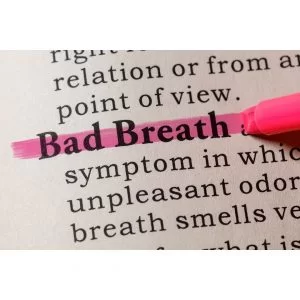Why do you have bad breath which is also known as halitosis. This is a common complaint that dental professional are regularly asked about. It is believed that 1 in 4 people in the UK suffer from bad breath. Bad breath is not something you should have to learn to live with, or something you should have to mask with mouthwash or breath mints. It’s also not something that should be ignored as it can be an indicator or underlying health problems.

What you eat and drink undoubtedly has a huge impact on how you breath smells.
Some foods and drinks dehydrate the mouth. Tea, coffee and alcohol all reduce salivary flow. Saliva is key in removing “bad” bacteria from the mouth. When the mouth is dry this allows the bacteria that cause bad breath to thrive and multiply.
Foods that have a pungent smell are an obvious cause of bad breath. Adding onions and garlic to every meal is a common cause of bad breath. They contain compounds that can enter the bloodstream and exit through the lungs. Which is why cleaning may not resolve bad breath. Having a diet high in protein, sugar or acids can also cause bad breath as the bacteria that naturally exists in the mouth feed on these, turning yummy food into bad smells.
The best thing you can do for your oral and whole body health is to stay hydrated. Always have water available sip on and sugar free chewing gum. These two tips will help you to stimulate saliva throughout the day and maintain the body natural defense against bad breath.
Smokers are more likely to experience bad breath due to the bad smelling chemicals in nicotine and it’s dehydrating affects. Smoking can also cause the tongue to stain a condition known as “furry” tongue. It is also a risk factor for gum disease which is a known cause of bad breath.

Click here to find out how to stop smoking!
Bad breath is usually due to a build-up of bacteria in the mouth, usually as a result of ineffective oral hygiene. Oral bacteria multiply every five hours. This means that skipping a day of brushing, missing areas when cleaning, or not using the correct brushing techniques cans allow bacteria to thrive.
To ensure good oral hygiene it is important to brush twice a day for at least two minutes with a good toothbrush and toothpaste containing at least 1450ppm fluoride. Interdental cleaning once a day using either floss or interdental brushes is also important to maintain good oral hygiene. If you are already doing all of these things. Then cleaning the tongue using a tongue scraper or cleaning it with a toothbrush could help reduce the amount of bacteria in the mouth. After brushing it is important that you do not rise afterwards to allow the ingredients in the toothpaste to be effective. If using mouthwash, you should avoid doing so straight after brushing. Instead wait at least an hour, or even choose to mouthwash after lunch.
Most adults experience gum disease at some point in their life. More often, this is the treatable form known as gingivitis rather than periodontitis which leads to erosion of bone. Unresolved dental issues like gum disease, tooth decay or wobbly teeth could also be the cause of bad breath.
Certain medications, such as antihistamines, antidepressants, diuretics, decongestants, the contraceptive pill and even certain vitamin supplements can change the way your body deals with certain bacteria. That means increased risk of gum disease and accompanying bad breath.
Some medical conditions, especially those related to the mouth and throat can impact breath.
Someone suffering from tonsillitis would, for instance, have a higher likelihood of suffering bad breath because of the build-up of bacteria. If bad breath appears to be linked to a medical condition such as this it is advisable to see if it persist after the condition has been treated.
In some instances, it may be easy to identify what the cause of your bad breath is. However there are many situations in which you will need the help of a dental professional to diagnose the cause and provide the proper advice and treatment. While there are many ways to try and prevent, avoid or minimise bad breath. There are many possible causes and often diagnosing the exact reason for this cannot be determined at home. When effective oral hygiene and a good diet still don’t help to improve your breath. It may be time to see a dentist and hygienist who will be able to assess your oral health and create a plan to stabilise it.

We are proud to help our valued patients to transform their smiles through a wide choice of general and cosmetic dental treatments.
Our TreatmentsWe ensure an exceptional patient journey – from start to finish.
learn moreDelivering life-changing smiles and ensuring excellent dental health.
learn moreDental implants and us – together we can recreate a naturally beautiful smile.
learn more